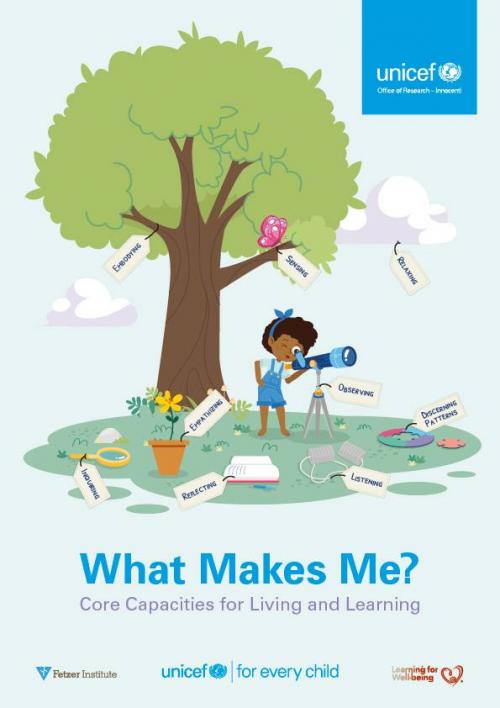
https://www.unicef-irc.org/what-makes-me
The report synthesises the work of nine detailed working papers – covering the core capacities of ‘Discerning patterns’, ‘Embodying’, ‘Empathizing’, ‘Inquiring’, ‘Listening’, ‘Observing’, ‘Reflecting’, ‘Relaxing’, and ‘Sensing’ – that individually review the empirical evidence on each core capacity in the academic literature. Each working paper assesses the contribution of the core capacities and the perspectives from which they are applied – mental, physical, emotional, and spiritual – to children’s well-being and development, and the practice and policies applied by adults working with children.
The purpose of the work is to assess how core capacities can improve the lives of children, and to understand the ways in which education systems and broader social systems can protect and promote these abilities. This project builds on the existing evidence base to better understand how children’s personal attributes (age and gender), and the world around the child, can promote the use of core capacities for benefit of child well-being and to improve policies and practices for child development.
The aim of this work is to use this learning to contribute practical steps to improve the living and learning conditions for children globally – not just in school, not just at home, but in their daily lives, and as they grow into adulthood.
FRAMEWORK
The academic literature on skills development in childhood is rich and varied. Overall, it seeks to understand what should be in a child’s ‘toolkit for life’. Children who are well-equipped for life will be more able to meet the opportunities and challenges they face at home, at school, and in the world at large.
For almost 20 years, the Learning for Well-being (L4WB) Framework has been one contribution to this literature, which proposes that through the application of the most innate human abilities – or ‘core capacities’ – children can better understand and interact with the world around them, for life and for learning, and to realise their unique potential. Core capacities can be viewed as cornerstones of life skills. The most innate and basic human abilities, so easily taken for granted, that they underutilised in efforts to promote child well-being and development. The nine core capacities in the framework are ‘Discerning patterns’, ‘Embodying’, ‘Empathizing’, ‘Inquiring’, ‘Listening’, ‘Observing’, ‘Reflecting’, ‘Relaxing’, and ‘Sensing’.
The L4WB Framework also proposes that each core capacity can be expressed through mental, emotional, and physical aspects, within a broader spiritual dimension, and in this way, come together to form a ‘holistic’ and a child-centred view of abilities development embedded at the centre of a broader and dynamic socio-ecological framework (a living social system).
Arrival of UNICEF at Innocenti
Inaugurated by Executive Director James Grant in 1988 as the UNICEF International Child Development Centre, with a broad mandate to contribute to an “emerging global ethic for children,” research quickly became a defining mission and the institution’s name soon evolved to Innocenti Research Centre, and finally to the UNICEF Office of Research – Innocenti.
Following ratification of the Convention of the Rights of the Child in 1989, a range of research projects at Innocenti contributed significantly in shaping UNICEF’s adoption of the human rights-based approach to development. Innocenti pioneered much early work on child protection as UNICEF’s mandate expanded in this area. Numerous Innocenti studies in the 1990’s focused on what were deemed “emerging issues” such as child trafficking, children in conflict with the law and child labour.
Innocenti today plays a critical evidence gathering and knowledge building role for UNICEF and its key partners on a wide range of cutting-edge children’s issues. In recent years Innocenti has played a leading role in improving social and economic policy for vulnerable children in both poor and rich countries. It is a leading centre on impact evaluations of cash transfer programmes in Africa. It coordinates multi-country research on the drivers of violence affecting children. It plays a central role in adolescent well-being, child rights and the internet, child rights implementation, family and parenting support policy and multi-dimensional child poverty analysis.










Add new comment